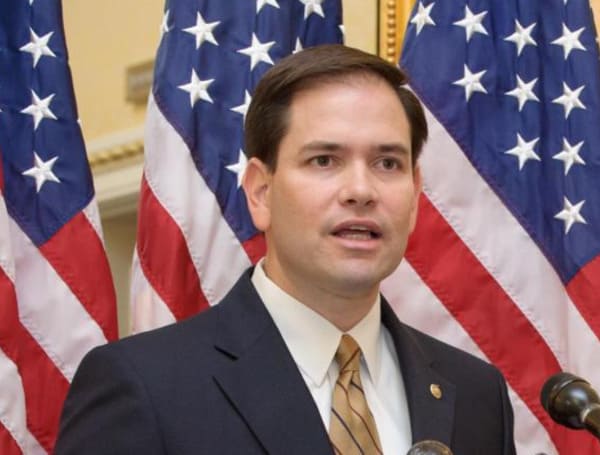Florida Sen. Marco Rubio argues that a Japanese firm’s deal for U.S. Steel is a threat to national security and should be rejected by the Biden administration.
In a recent opinion article in Newsweek, the Florida Republican maintained that the demise and auctioning of one of America’s most historic and iconic brands speaks volumes about our nation’s lack of self-reliance on matters that affect national defense.
In Newsweek, Rubio commented on Nippon Steel’s successful bid to claim U.S. Steele during an auction in December.
Rubio and fellow Republican Sens. J. D. Vance of Ohio and Josh Hawley of Missouri immediately petitioned the Committee on Foreign Investment in the United States, a division of the Treasury Department with authority to review and approve or deny such transactions, to reject the deal.
Rubio argued that the sale should be reversed because it is not just a “poignant metaphor for the deindustrialization of America,” but also “presents real danger to our long-term economic and national security.”
The sale occurred partly because U.S. Steel, once the world’s largest and most prestigious steel company, now ranks just 27th among global producers.
But the transaction should be about more than dollars and cents, Rubio said.
He noted that even some conservatives have criticized his position on the sale.
They argue that Japan is an ally, that Nippon simply cannot move the entire U.S. Steel operation overseas, and even if the company totally disappeared, America could still meet its steel needs.
Read: US Border Patrol Agents Quietly Support Texas Move To Seize Area Of Border
Rubio argued people should not be persuaded by such claims.
The senator agreed that Japan is an important U.S. ally and that “our friendship with Tokyo is beyond dispute and essential as we confront the threat of communist China together.”
“But even the best of friends don’t see eye to eye on everything — to argue otherwise in the dangerous realm of national security would be foolish,” he continued.
“It is common sense that there are some things you shouldn’t entrust to others when you can do them yourself. Managing America’s steel factories, which manufacture the fundamental building blocks of modern civilization, is one of those things. It’s no insult to Japan to say so.”
Rubio also swiped at alleged “defense hawks” who seem satisfied only the “adequacy” of America’s defense industrial base.
The nation is now embroiled in three military conflicts to certain degrees.
Rubio offered that it would be difficult to ramp up steel production for military hardware if things get hotter.
He pointed out that the Commerce Department has noted that “existing domestic steel production capacity would be unable to meet national security requirements” in a major war.
“To change course, we must abandon the ‘short-termism’ and naïve globalism so prevalent on both Left and Right,” he wrote. “Far too many seem to think that immediate profits matter, while long-term strength and sovereignty do not. But there is a difference between tending to the present and forgetting about the future, just as there is a difference between domestic and foreign companies.”
Led by the Clinton administration, our defense industrial base has “atrophied to the point where the ‘arsenal of democracy’ is now struggling to aid allies in two international wars, even though the United States is not a direct participant in either of them.”
Read: Federal Taxes, Spending, And Deficit All Up From First Quarter Of FY2023 To FY2024
“Any number of further conflicts could arise in the years to come, including with communist China. God forbid that we should be forced to fight protracted battles with modern industrial enemies — but are we prepared for that contingency?”
“Right now, the answer is clearly no,” he added.
America, he maintained, can revive its industrial foundation that undergirds our national defense. But two things must happen.
First, Rubio said, the CFIUS must get serious about its evaluation of deals involving foreign interests.
For example, Russia in 2008 had acquired nearly 10% of American steel production, and since CFIUS did nothing to stop those deals, many of those steelyards were simply liquidated.
Secondly, “We also need a broader understanding of national security,” Rubio wrote.
He said most policymakers would agree that we need to “fortify” vital supply chains.
“But most are happy to hide behind the Biden administration’s ‘small yard, high fence’ formulation, which claims only cutting-edge technologies are worthy of federal protection,” he said.
“In reality, we need much broader safeguards. As COVID-19 revealed, depending on foreign companies for everything from medicine to missiles may not seem dangerous in peacetime, but in a time of crisis, it can throw the whole country off balance.”
“The time has come to take basic sectors like steel as seriously as microchip manufacturing, artificial intelligence, and other buzz-worthy industries,” Rubio concluded.
“In a time of major conflict, we will need American steel—and lots of it—to remain free.”
Android Users, Click To Download The Free Press App And Never Miss A Story. Follow Us On Facebook and Twitter. Sign up for our free newsletter.
